Don't tell researchers how to research
The line between scientists and government is frought with danger, as DR WILL GRANT writes in the new ANU Reporter.
Subscribe to receive the next print edition of ANU Reporter.
It is said that the solution to the ills of democracy is more democracy. The same goes for science too. Generally speaking, it's never a problem to bring more science to bear on an issue.
In those terms, the interim report released in June by the Senate's Select Committee on Wind Turbines appears entirely reasonable.
Drawing on an earlier finding by the National Health and Medical Research Council (NHMRC) that "the body of direct evidence" on the possible impacts of wind farms on human health is "small and of poor quality", the Senate Committee concluded that "independent, multi-disciplinary and high quality research into this field is an urgent priority". And that's not, on the face of it, a bad thing.
After all, what scientist worth their salt would reject the idea of doing more and better research on a possible problem?
When the Senate Committee asks, "Why are there so many people who live in close proximity to wind turbines complaining of similar physiological and psychological symptoms?", who would deny that it's important and legitimate to try and find out the answer?
But here's the thing. Research on this topic doesn't exist in a political or economic vacuum. It is well established that renewable energy broadly and wind turbines, in particular, are matters of significant political debate.
Prime Minister Tony Abbott has asserted his intention when renegotiating the Renewable Energy Target was to "reduce the number of these things [wind turbines] that we are going to get in the future", while his government will appoint a "wind commissioner" to address complaints about the industry.
Meanwhile, key members of the Senate Committee have used their positions to speak stridently against wind energy. Against this backdrop, is it really possible to pause the world to undertake entirely neutral research?
There are allegations that suggest the Senate Committee is less interested in truly independent, high-quality research than its members might claim and is instead recommending to the NHMRC the researchers whose work they would like to see included in future assessments.
Those allegations would seem to be supported by the following exchange from the Committee's hearings between Senator Chris Back and the NHMRC's executive director for evidence, advice and governance Samantha Robertson:
Back: Are you familiar with [Simon] Carlile and the work he does in neurophysiology?
Robertson: Not personally, no.
Back: Ok, [he is] at the University of Sydney, so perhaps I could urge that you do.
That is not what I would call independent and nor do I think it is likely to lead to high-quality science.
This is nothing to do with the quality of Carlile's research but rather the principle of scientific advice to government. It is the NHMRC's job to select the most relevant science and present it to government, not the other way around.
But more importantly, when we've had inquiry after inquiry into this topic - with no rigorous scientific process finding any evidence of a human health impact - at what stage do we accept that harassing the research community to keep going until it produces a different answer isn't a great way to do science?
Last year, when the Abbott Government began renegotiating the Renewable Energy Target we learned a significant lesson in energy economics.
Without any new policy announcement and before the target had actually been reduced, investment in renewable energy in Australia fell off a cliff. Uncertainty, not hard financial facts, was enough to kill investment.
The continued call for research raised by the Senate Committee fits well within this pattern. You don't need to remove a policy to kill investment. You only need to make things uncertain.
Dr Will Grant is lecturer, researcher and graduate studies convenor at the Australian National Centre for the Public Awareness of Science at ANU.

